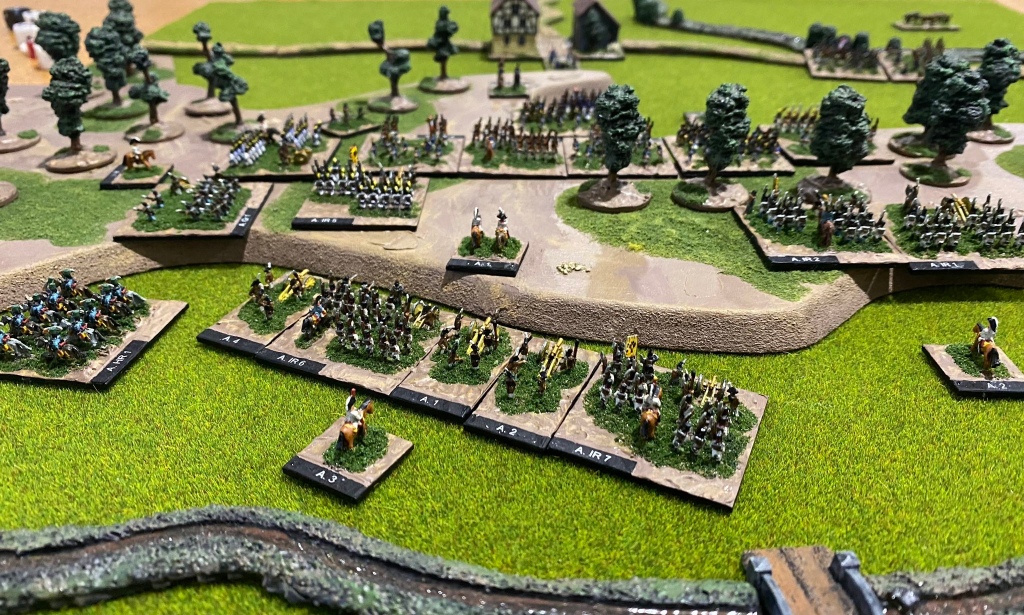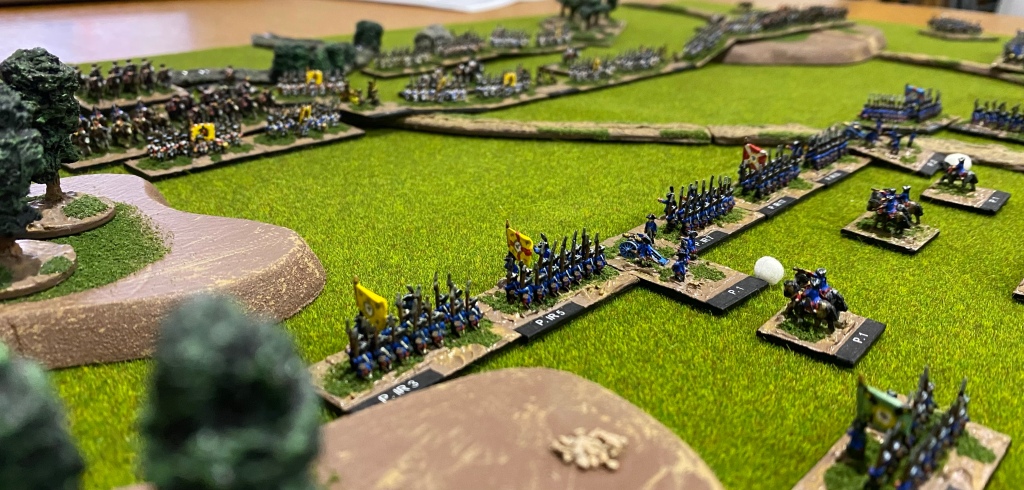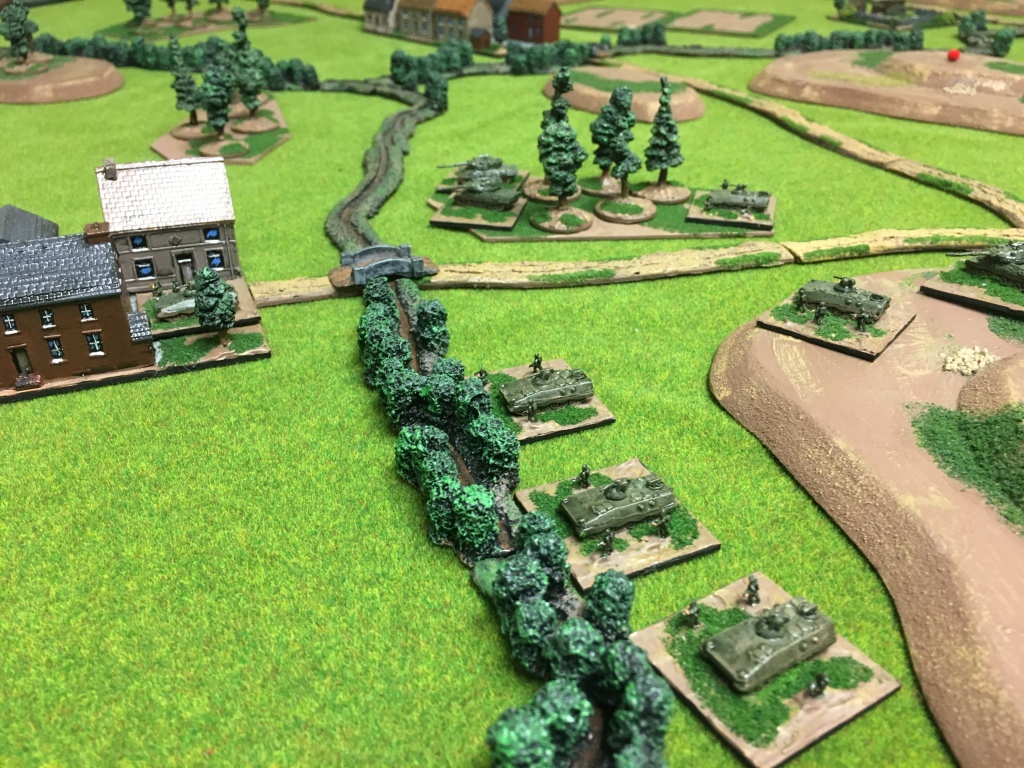Historical refights, campaigns, scenarios or competitions using points systems for balance. What is your preference? Over recent weeks I’ve listened to a few podcasts and YouTube videos where various people have articulated their preferences, sometimes with clearly strong views. A theme has been a dislike for points systems almost always linked to competition formats. But is it as simple as that?
In a previous post I mentioned that I have less interest in competition games these days. Without doubt this is a result of my experience with overly competitive players, both during and before the game. A hallmark of such players, apart from their “in game” antics, are customised lists tuned to give every benefit possible. In my view these customised armies are a far cry from an historic general’s challenge of making do with the troops available. That said if you have a good group of players then competitions can provide an excellent means of playing games, at least against a group of likeminded players. I do recall several excellent events in the past. But if competitions are out for me then what do I base my games around?

I have refought several historical battles of the Napoleonic or American Civil War periods, as well as a few others from other periods. Reading historical accounts, modelling the terrain and deploying the armies can, I find, be immensely satisfying. How did terrain impact the battle, what determined a particular strategy? All these factors combine to help me further understand an historical battle. Unfortunately I can only refight so many historical battles, and of course the preparation time can be significant.
Campaigns have a strong draw. Historical campaigns have the same appeal as historical refights. Yet my experiences suggest a “successful campaign” can result in unequal battles, which may not be particularly satisfying for players. I am therefore of the view that campaign mechanics should be relatively simple providing a narrative for a game. In particular they provide context for the battle and link individual battles together. Alternatively, a campaign could be played as a seperate game in an evening, likely as a board game.
These days the majority of my tabletop games are scenario based. Yet scenarios can be challenging to develop. How do you create a tactical problem that is generally balanced, interesting and of course challenging?

One option is scenario books. I have found some published scenarios have produced very interesting battles. Yet, sometimes the terrain or force requirements are challenging to replicate, reducing the number of scenarios that can be played. If the scenario book is too generic they are at level that doesn’t interest me. I am for example interested in the larger battle. So five Napoleonic regiments capturing a bridge doesn’t normally interest me. So, if scenario books are not always of use what do I do?
Well, if the scenario designer has done his job correctly he has somehow balanced the scenario, assuming he wants to provide a tactical challenge with an equal chance of success for each side. Here for me is the clue.

The majority of scenarios I play have been developed by scenario system either as part of the rules, or as a close addition. Particular examples are the well designed system within Volley & Bayonet and my own system for Spearhead. To help balance the scenario both examples use points systems.
Does this bring me full circle? I mean points and the inherent optimisation they bring are the very problem with competitions aren’t they? Well I don’t think so. I feel points systems can be a useful tool to help balance a scenario. However, that only works if players do not restrict themselves to the same points budget or composition in each game.
The most obvious means of variation is to changing your army composition creating variation. For example using more or less cavalry or different battalion formations. Alternatively you could use a fewer points than your opponent, giving him an advantage. Montrose didn’t seemed that concerned by points budgets. Perhaps different budgets can be used between games. Such a change certainly creates different force structures and therefore challenges. In my view all add variety and tactical interest, much like historical battles.
This of course has been something of a long rambling post. However, in summary I believe points can be a useful tool to balance scenarios. They need not always be associated with competitions.
Before I sign off I must ask, is your preference historical refights, campaigns, scenarios or competitions and of course, why?
Interesting post Keith. My preference is for scenarios or historical refights. As to the why, I think it is to do with the immersion factor. It feels like there is a reason for the battle, and that the goal is not just to break your opponent’s army before they break yours. I like the way scenarios enable battles between uneven forces with each having their own win condition – ie you don’t necessarily have to defeat your opponent to win the game
Absolutely agree. Battles were not always even, why should miniature armies be? Further, you don’t need to defeat your opponent to “win”. That is especially the case, and more easy to gauge, in an historical refight where you can compare your performance against what historically occurred.
Keith: Excellent article. Keep up the good work.
Thanks Peter. I’m hoping to revisit a few ACW historical battles this year, but this time on my wargames table.
Keith, as you know competition games are the only way I get to play. I run a 2 day tournament where I try to get away from standard competition style games. At this year’s MOAB the 1st day will be themed to showcase one of the least loved troop types of DBA, warbands. The 2nd day will be a series of 10 scenarios bases on battles fought in Britain from Watling St and ending with the battle of Flodden.
I think themes like this are excellent. They really allow the potential to break away from the normal competition format and frequently used armies.
That said even without themes DBA has the potential to break the points paradigm as armies are mostly based on troops available rather than overly customised lists. Further, their is no need to limit yourself to one army, with armies being small. I often tried to use weak or interesting armies, simply because they are different. You always seemed to pick DBA armies like that.
Finally, you highlight the benefit of competitions. Players can gather and play games against people they may not normally see. It’s a great way to renew friendships and interact.
Yes to all 4 but….
Historical refights require players to have a decent understanding of the rules. I’ve played in several where a better understanding of the nuances of the rules could have made the difference between winning and my side. Historical refights also require a lot of research if starting from scratch. Scenarios also require a bit of work to make sure that both sides has a fighting chance of winning.
I might be in the minority but I have always really enjoyed competitions. While occasionally you get a crap opponent, I’ve had some really cracking games. and playing people that you have never met before is always good. I also enjoy the list writing part of it, not for the maximisaion of an army list but rather a “If I do this, is it an interesting army to play on the table?”
I really don’t know if you are in the minority or not when it comes to competition games Rhys. But if you enjoy them that’s great. I certainly have enjoyed many such games in the past and met some great opponents for the first time.
I’m just fascinated by the dislike of points on some podcasts and YouTube commentaries recently. Yet the same commentators are equally satisfied with scenarios. My argument is points need not be only used in competitions. Nor do historical refights or scenarios need to balanced. Create a tactical challenge and try and solve it within the forces available. That could include one of your fascinating lists – that I’ve experienced playing against.
Nice article and a lot to think about.
I always struggle with the concept of “historical refights”. The historical generals knew way less about the upcoming fight than us, like numbers and quality of troops, terrain, rules (yes, rules – we know exactly what mechanisms make the game, the generals back then didn’t) etc. How can a re-fight be historical, then?
And I believe the “unequality of forces” in historical scenarios might be overated as well – i tend to the view that most historical battles were not overly unbalanced (at least in the perception of the generals), because if they were, one side would not have fought the battle in the first place. The 300 are famous today because they were the exeption, not the rule.
Also I don’t believe you “can compare your performance against what historically occurred” (no offence meant) as the very rules we use are designed by and (hopefully) validated against the historical battles. So if I win as Alexander against Darius at Gaugamela it is not because I am a brilliant general just like him but because the rules take Alexander beating Darius as the base to build mechanisms upon.
Sidenote: I believe many (at least some) rules designers refine their rules to the point where historical refights are won by say two thirds of the time by the historical winner and one third by the other.
What I like best are “almost” historical refights, battles that did happen but we have little details of. From history we know of so many battles only roughly (if at all) when and where they happend. Take that as your start, so you have an attacker, a defender and kind of a reason the battle is happening, then use your favorite rules and point system to design the battle like it might have been. I would grant the attacker 10% more points and the defender some advantage of terrain. And of course you can create such scenario-battles with the adaption of “grand tactical wargames”, but that is rather stuff for a campaign, I guess.
Some excellent thoughts here. Thank you for taking the time to compile your reply.
To your points on our knowledge of historical battles I have long felt that some battles such as Chancellorsville are extremely difficult to refight as the element of surprise is almost impossible to replicate. That said other battles also have challenges as reinforcement schedules and force composition are often well known. That said they can assist in our knowledge of the how historical battles unfolded by providing a greater understanding of terrain, command challenges and force composition.
I hope the post and replies have provided some points to ponder for readers, in addition to the role of points budgets.
Definitely in… neither camp!
I have never played in competitions.
Whilst having fought some historical refights I now avoid them. I like not knowing how the battle was fought or ended before starting my own.
Scenario based games are my preferred option, and that includes skirmish type games.
Thanks for posting Peter. I certainly know that being aware of historical outcomes, or decisive events, in an historical refight can be a challenging issue to overcome. I think I rather like a mix.
It’s great our hobby can support several approaches, none of which are of course wrong.